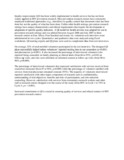Ensuring quality of services in HIV prevention research settings: findings from a multi-center quality improvement pilot in East Africa

View/
Date
2010Author
Bahati, Prince N
Kidega, William
Ogutu, Hilda
Odada, Jane
Bender, Bonnie
Fast, Pat
Becker, Julie
Price, Matt
Language
enMetadata
Show full item recordAbstract
Quality improvement (QI) has been widely implemented in health services but has not been widely applied in HIV prevention research. Most prevention research centers have commonly employed traditional approaches (e.g., checklists) to quality control that document what has been done but not the quality of what has been done. Unlike other health settings, prevention research settings have unique characteristics and ethical requirements that require the development or adaptation of specific quality indicators. A QI model for health services was adapted for use in prevention research settings and was piloted between August 2006 and July 2007 at three research centers in East Africa. Four hundred and twenty-six volunteers exit interviews were administered in two cycles. Quantitative and qualitative data were analyzed using Excel worksheets. QI meeting reports and QI plans were used to complement data from exit interviews.
On average, 52% of total enrolled volunteers participated in the exit interview. The designed QI plans successfully helped reduce volunteers’ reported waiting time to see counselors (p<0.001) and pharmacists (p<0.001). It also increased the percentage of interviewed volunteers who reported being counseled on family planning at clinical trials (from 66 to 93%; p=0.02) at follow-up visits, and who were refreshed on informed consent at follow-up visits (from 90 to 96%; p=0.009).
The percentage of interviewed volunteers that expressed satisfaction with services received from counselors increased (from 87 to 94%; p=0.009) while the percentage of volunteer satisfied with services from trial physicians remained constant (93%). The majority of volunteers interviewed reported satisfaction with other major components of research such as confidentiality, understanding of trial objectives, benefits and risks of participation, and risk reduction counseling. However, satisfaction with services from community outreach workers and other staff at research centers dropped over the course of the study (from 88% in Cycle 1 to 74% in Cycle 3; p= < 0.001).
Increased commitment to QI is crucial in ensuring quality of services and ethical conduct of HIV prevention research centers.
URI
http://www.tandfonline.com/doi/abs/10.1080/09540120903012569#.VcNaZLXB3s0http://hdl.handle.net/11295/89633
Citation
AIDS Care: Psychological and Socio-medical Aspects of AIDS/HIV Volume 22, Issue 1, 2010Publisher
University of Nairobi
Collections
- Faculty of Health Sciences (FHS) [10415]
